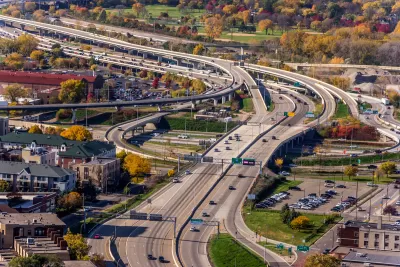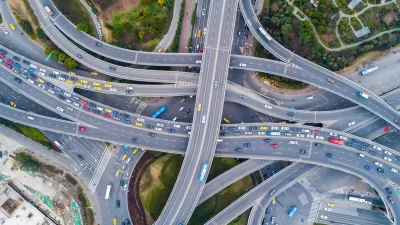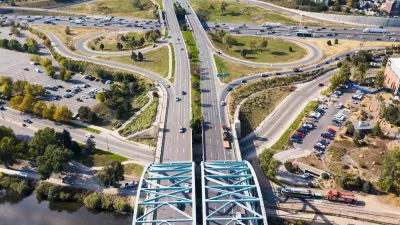The state’s department of transportation will have to consider potential greenhouse gas emissions and alter projects that don’t meet emissions reduction targets.

A 2023 Minnesota state law aimed at reducing greenhouse gas emissions “sets its sights squarely on transportation” by directing the Minnesota Department of Transportation (MnDOT) to consider climate impacts and demand for vehicle miles traveled in proposed highway and road expansion projects.
As Janet Moore explains in The Star Tribune, “If those calculations do not meet MnDOT's targets, the scope of the project must be altered ‘until it conforms,’ or it could be dropped, according a state working group that studied the new law.” A project can also include mitigating measures such as public transit, bike and pedestrian paths, environmental restoration, and roundabouts.
According to Jon Solberg, MnDOT's assistant division director for sustainability, “it's not unlike dealing with wetland mitigation, or crafting ways to comply with existing state and federal environmental laws when planning a new project. It will also encourage agencies, regional planning bodies and local governments to work together more to ensure the targets are met.”
The policy, which goes into effect next February, is part of a broader plan to reach net zero carbon emissions in the state by 2050. According to MnDOT, the agency is focusing on maintaining its existing road system and not planning major expansions.

Manufactured Crisis: Losing the Nation’s Largest Source of Unsubsidized Affordable Housing
Manufactured housing communities have long been an affordable housing option for millions of people living in the U.S., but that affordability is disappearing rapidly. How did we get here?

Americans May Be Stuck — But Why?
Americans are moving a lot less than they once did, and that is a problem. While Yoni Applebaum, in his highly-publicized article Stuck, gets the reasons badly wrong, it's still important to ask: why are we moving so much less than before?

Research Shows More Roads = More Driving
A national study shows, once again, that increasing road supply induces additional vehicle travel, particularly over the long run.

Judge Halts Enforcement of Anti-Homeless Laws in Grants Pass
The Oregon city will be barred from enforcing two ordinances that prosecute unhoused residents until it increases capacity and accessibility at designated camping sites.

Advancing Sustainability in Los Angeles County Schools
The Los Angeles County Office of Education’s Green Schools Symposium brings together educators, students, and experts to advance sustainability in schools through innovative design, climate resilience strategies, and collaborative learning.

Using Old Oil and Gas Wells for Green Energy Storage
Penn State researchers have found that repurposing abandoned oil and gas wells for geothermal-assisted compressed-air energy storage can boost efficiency, reduce environmental risks, and support clean energy and job transitions.
Urban Design for Planners 1: Software Tools
This six-course series explores essential urban design concepts using open source software and equips planners with the tools they need to participate fully in the urban design process.
Planning for Universal Design
Learn the tools for implementing Universal Design in planning regulations.
City of Moreno Valley
Institute for Housing and Urban Development Studies (IHS)
City of Grandview
Harvard GSD Executive Education
NYU Wagner Graduate School of Public Service
City of Cambridge, Maryland
Newport County Development Council: Connect Greater Newport





























